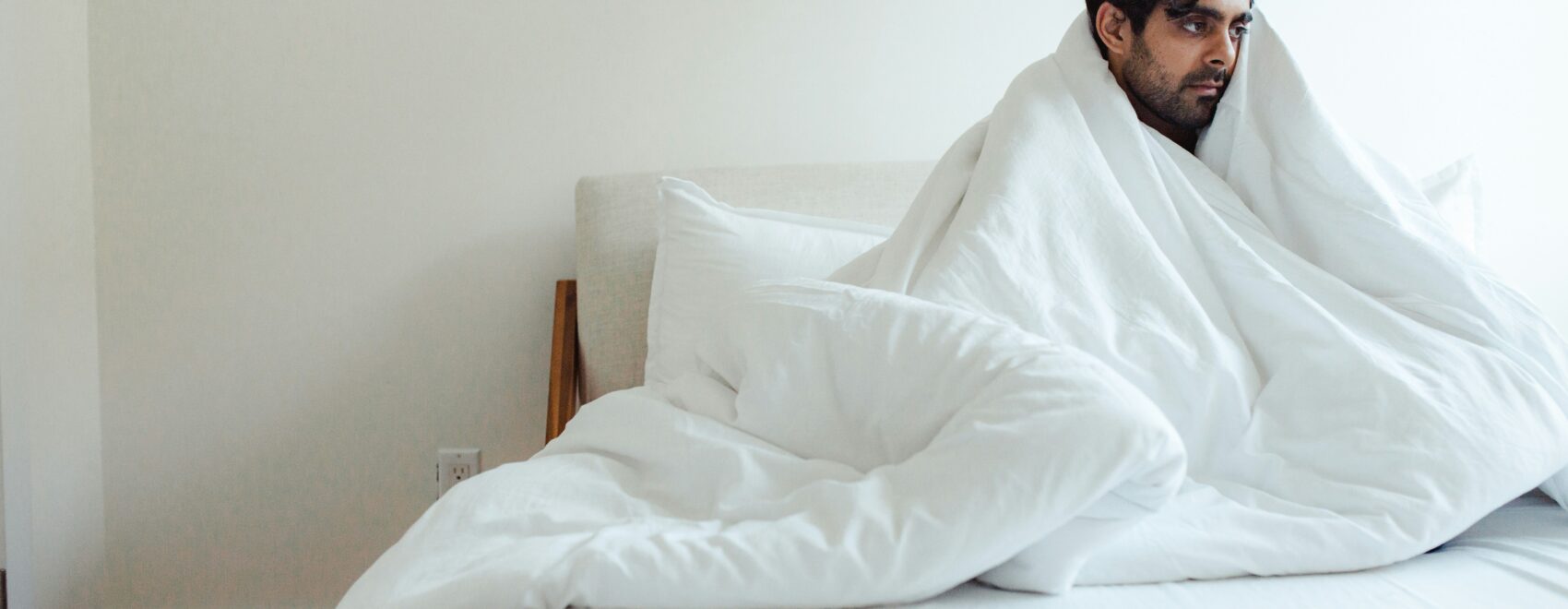Four years ago, the pandemic rocked our world. And while the lockdowns and mask mandates have come and gone, a new chronic condition has emerged: long-COVID.
Recovering from long COVID is tough. You may have to cut back on work and feel like you’re dragging yourself just to get through the day.
I should know, as I’m recovering from long COVID myself and have helped dozens of patients recover. So this topic is deeply personal to me. Fortunately, I’ve seen firsthand how a holistic approach can help you reclaim your health.
In this guide, we’ll cover natural remedies to strengthen your immune system, so you can get on the road to recovery. But first, let’s cover some basics.
What is Long-Haul COVID?
Simply put, long COVID, also known as post-COVID-19 condition, is when COVID symptoms linger for over 3 months.1
Anyone who’s been infected with SARS-CoV-2 can develop long COVID, no matter how mild or severe the infection. So far, it’s estimated that over 17% of Americans have experienced long COVID at some point.2
Long-Haul COVID Symptoms
Over 200 symptoms are linked with long COVID. Fatigue is by far the most common symptom, affecting as many as 87% of people.3 This was definitely the case for me. Often, I’d sleep for 10-12 hours and still wake up exhausted.
Other long COVID symptoms may include:3
- Brain fog
- Post-exertional malaise
- Memory issues
- Insomnia
- Depression
- Anxiety
- Headaches
- Muscle aches
- Joint pain
- Dizziness
- Shortness of breath
- Heart palpitations
- Tightness in chest
Symptoms vary from person to person. For some people, symptoms come and go. For others, they may worsen over time. Stress, alcohol, strenuous exercise, and hormone changes may lead to flare-ups.3
Long COVID can also cause people to develop other health conditions like:4
- Postural orthostatic tachycardia syndrome (POTS)
- Mast cell activation syndrome (MCAS)
- Myalgic encephalomyelitis/chronic fatigue syndrome (ME/CFS)
- Anxiety or depression
- Diabetes
- Heart issues
What Causes Long COVID?
It’s not entirely clear. But several theories are floating around, including:
- Inflammation. COVID-19 can trigger a cytokine storm that may lead to prolonged inflammation.5
- Viral persistence. Leftover viral fragments can hang around in your body for over a year after the initial infection.6
- Organ damage. The virus may damage organs like your lungs, kidneys, heart, liver, pancreas, and spleen.7
- Reactivation of viral infections. COVID-19 may reactivate past viral infections like the Epstein-Barr virus.7
- Endothelial dysfunction. The virus may damage the cells that line blood vessels, restricting blood flow to your organs.
- Autoimmunity. Viral infections, like COVID, can trigger autoimmune conditions.8
- Microclots. COVID-19 may cause tiny blood vessels to form, blocking blood flow to your tissues.5
- Disruption of gut microbiome. Roughly 70% of your immune system lives in your gut.9 COVID-19 has been shown to alter this delicate ecosystem.5
- Nervous system dysfunction. The virus may disrupt the vagus nerve, a part of your autonomic nervous system, and the highway between your gut and brain. 10
Natural Remedies to Support Long COVID Recovery
Unfortunately, there’s no quick fix to reverse long COVID. Recovery takes patience and a multi-pronged approach.
The good news? Many natural remedies can help your body recover from long COVID. I’ll share the best supplements and natural treatments for long COVID in my next article, so stay tuned. But it’s important to have some foundational habits in place first.
Here are some natural remedies you can implement right away to support your recovery:
Pace yourself

One of the best things you can do to recover from long COVID is to conserve your energy. Enter pacing–a technique that’s often used for chronic pain and chronic fatigue syndrome.11 Research suggests pacing may improve recovery rates for long-haulers too.12
Pacing involves taking stock of your energy reserves each day and not pushing yourself past your limits. This could mean scaling back on work, pressing pause on exercise, and not spending long chunks of time on mental tasks.
Taking frequent rest breaks throughout the day is also a must. Start small, and slowly work your way up. This can be tough, especially if you’re the “go-getter” type. But if you push yourself too hard too fast, it could lead to a flare-up. Slow and steady wins the race.
Step up your sleep habits

Your body needs sleep to heal. Unfortunately, sleep disruption is common in long COVID.13 It’s the ultimate catch-22.
Luckily, improving your sleep habits may help you catch more Zzz’s and support your recovery. Here are some sleep hygiene tips that may help:
- Limit or avoid electronic devices before bedtime. When you do use them, use a blue-light filter like f.lux or wear blue light blocker glasses.
- Spend the hour before bed doing relaxing activities to help you unwind. Journal, take a bath, do a guided meditation or breathwork, or try progressive muscle relaxation.
- Dim the lights after sundown to support melatonin production.
- Lower the thermostat before bed to signal your circadian rhythm it’s time to wind down.
- Make sure your sleep environment is dark, quiet, and cool. Sleep masks, blackout curtains, white noise machines, and earplugs can come in handy here.
- If your fatigue is bad, taking a short nap is okay. But keep it 30 minutes or less. Anything over that may disrupt sleep.
Anti-inflammatory diet

Inflammation is a major driver of long COVID. And the foods you eat can either create inflammation or cause it. Sugar, alcohol, fried foods, and processed foods are all known inflammation triggers. So it’s best to avoid them.
On the other hand, some studies suggest the Mediterranean diet can benefit long-haulers.14 The Mediterranean diet is chock full of foods that lower inflammation like leafy green veggies, nuts, olive oil, tomatoes, fatty fish, and antioxidant-rich fruits like blueberries.
No need to follow the Mediterranean diet to a T. Just opt for wholesome foods like fruits, veggies, whole grains, and legumes over processed ones. Spices also have potent anti-inflammatory powers. Try adding spices like turmeric, ginger, garlic, rosemary, and cinnamon to your food whenever you can.
For an extra boost, sip a cup of green tea. It contains a compound called EGCG that has powerful anti-inflammatory effects.15 Fermented foods like yogurt, sauerkraut, miso, kimchi, and kefir can also help. Rich in probiotics, they help balance your microbiome and reduce gut inflammation.
Reduce stress

Stress triggers inflammation, which can worsen long COVID symptoms and make them linger longer.16 That’s why one of the best things you can do to help your body recover is to calm your nervous system.
One easy way to do this is to make time each day for things you enjoy. Go for a walk, read a book, play with your dog, listen to your favorite song, or watch a funny movie. And if you’re feeling overwhelmed, don’t be afraid to ask your family or friends for support.
Mindfulness, gentle yoga, and vagus nerve exercises can also relieve stress and help you find some inner calm. Breathwork exercises, like diaphragmatic breathing or the 4-7-8 breath, can trigger the relaxation response too. Anytime you feel stress getting out of hand, try taking five minutes to breathe and reset.
Daily sun exposure

Studies show people who get more sunshine are more likely to recover from COVID-19.17 This isn’t all that surprising. Sun exposure boosts the production of vitamin D–a nutrient that calms inflammation and supports immune health.
Daily sunshine also helps you snooze more soundly, which can help you heal faster. It syncs your circadian rhythm and helps your body make more of the sleep hormone melatonin. On top of that, being outdoors calms the stress response, which can support your recovery.
So how much sunlight is enough? It depends on the person and where you live. But experts say somewhere between 5-30 minutes should do.18
For bonus points, try “grounding,” placing your bare feet on the earth while you soak up some sun. Research shows making contact with the earth’s surface lowers inflammation and supports the immune system.19
Try intermittent fasting
Intermittent fasting is also emerging as an effective treatment for post-COVID recovery.20 Fasting promotes autophagy, a process that breaks down damaged cells.21
According to some studies, practices that increase autophagy–like fasting–can help clear the spike protein.22 And clearing the dreaded spike protein is key to long COVID recovery.
If you’re new to intermittent fasting, keeping a 12-hour fasting window is an easy way to start. For example, if you ate your last meal at 7 pm, wait to eat breakfast until 7 am. As your body adjusts, you can gradually increase your fasting window to 14-16 hours.
How Long Does It Take to Recover From Long-COVID?
It’s hard to say. Some people recover in a few months. Others may take over a year. Some symptoms may resolve fairly quickly, while others may linger. No matter your symptoms, implementing the lifestyle habits above will support your body’s recovery.
Support Long COVID Recovery with Functional Medicine in Orland Park, IL
The natural remedies we covered will give you a solid foundation to recover from long COVID. And for some, these habits alone may be enough to achieve a full recovery.
But if you try these strategies and are still struggling, you may want to see a functional medicine doctor. They can identify any root imbalances that may be blocking your recovery.
If you live in the Chicago area and could use some support in your long COVID recovery, Anchored in Health is here for you.
Book your appointment with our functional medicine doctor here– and let’s get you feeling better!
Other Health and Wellness Services Offered at Anchored in Health in Orland Park, IL
At Anchored in Health, functional medicine isn’t all we do. We offer a variety of services to help you feel your best. This includes chiropractic care, acupuncture, massage therapy, and the Shape ReClaimed program. We even offer functional assessments like genetic testing and thermography to help you learn more about your body.
Contact us to find out how we can help you live a healthier, happier, life!
Disclaimer: The information provided on this blog is for educational and informational purposes only and is not intended to diagnose, treat, cure, or prevent any disease. The content is not a substitute for professional medical advice, diagnosis, or treatment. Always seek the guidance of a qualified healthcare provider with any questions you may have regarding your health or a medical condition.
Reading this blog does not establish a doctor-patient relationship between you and Anchored In Health or any of its practitioners. Reliance on any information provided in this blog is solely at your own risk. For medical concerns, always consult a licensed healthcare provider.
Sources:
- https://www.cdc.gov/covid/long-term-effects/index.html
- https://www.cdc.gov/nchs/covid19/pulse/long-covid.htm
- https://www.thelancet.com/journals/eclinm/article/PIIS2589-5370(21)00299-6/fulltext
- https://www.mayoclinic.org/diseases-conditions/coronavirus/in-depth/coronavirus-long-term-effects/art-20490351
- https://www.ncbi.nlm.nih.gov/pmc/articles/PMC10113134/
- https://www.eurekalert.org/news-releases/1036945
- https://www.nature.com/articles/s41579-022-00846-2
- https://www.ncbi.nlm.nih.gov/pmc/articles/PMC10051805/
- https://pubmed.ncbi.nlm.nih.gov/33803407/
- https://www.ncbi.nlm.nih.gov/pmc/articles/PMC10412500/
- https://www.ncbi.nlm.nih.gov/pmc/articles/PMC3812193/
- https://pubmed.ncbi.nlm.nih.gov/36111386/
- https://www.ncbi.nlm.nih.gov/pmc/articles/PMC10170021/
- https://www.ncbi.nlm.nih.gov/pmc/articles/PMC8954128/
- https://www.ncbi.nlm.nih.gov/pmc/articles/PMC3401676/
- https://www.jns-journal.com/article/S0022-510X(22)00349-5/fulltext
- https://www.ncbi.nlm.nih.gov/pmc/articles/PMC7184988/
- https://ods.od.nih.gov/factsheets/VitaminD-HealthProfessional/
- https://www.ncbi.nlm.nih.gov/pmc/articles/PMC4378297/
- https://nbcmontana.com/news/nation-world/intermittent-fasting-emerges-as-effective-treatment-for-long-covid-19-coromiavirus-eat-less-food-research-frontline-covid-19-critical-care-dr-paul-marik
- https://www.ncbi.nlm.nih.gov/pmc/articles/PMC10222799/
- https://www.ncbi.nlm.nih.gov/pmc/articles/PMC10509423/
